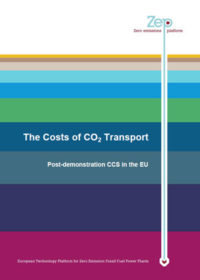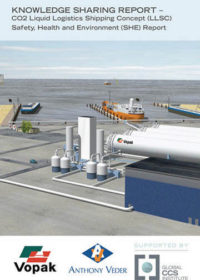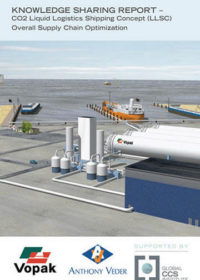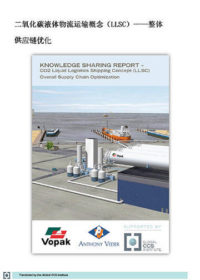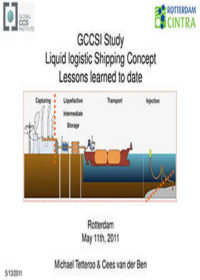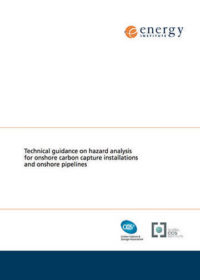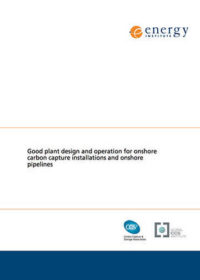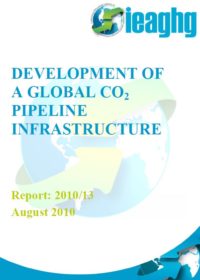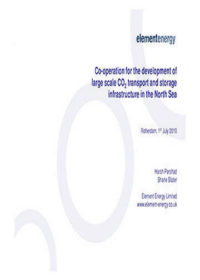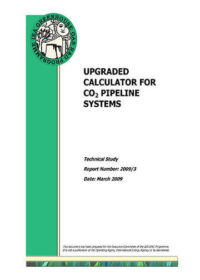Resources
Publications
Our publications, reports and research library hosts over 500 specialist reports and research papers on all topics associated with CCS.
View our Publication Library Disclaimer.
Filter by
The costs of CO2 transport: post-demonstration CCS in the EU
15th July 2011
Topic(s): Carbon capture use and storage (CCUS), CO2 transport, Economics
The companies, scientists, academics and environmental NGOs that together make up the Zero Emissions Platform (ZEP) have undertaken a ground-breaking study into the costs of CO2 transport based on new data provided exclusively by ZEP member organisations on existing pilot and planned demonstration projects. This report describes three methods of transportation namely onshore pipeline transport, offshore pipeline transport and ship transport.This report presents detailed cost elements and key cost drivers for each transport method.
Disclaimer
The content within the Global CCS Institute Publications, Reports and Research Library is provided for information purposes only. We make every effort and take reasonable care to keep the content of this section up-to-date and error-free. However, we make no claim as to its accuracy, currency or reliability.
Content and material featured within this section of our website includes reports and research published by third parties. The content and material may include opinions and recommendations of third parties that do not reflect those held by the Global CCS Institute.
Knowledge sharing report. CO2 liquid logistics shipping concept (LLSC): safety, health and environment (SHE) report
22nd June 2011
Topic(s): Carbon capture use and storage (CCUS), CO2 hubs, CO2 transport, Health safety and environment
To support the early deployment of CCS in Rotterdam and the development of a Rotterdam CCS Network, the Global CCS Institute supported Vopak and Anthony Veder to conduct a feasibility study on their CO2 liquid logistics shipping concept that will provide emitters with a complete logistical transportation solution for captured CO2 from their site to an offshore storage location.
This concept comprises a CO2 terminal (or a ‘CO2 hub’) which is capable of gathering CO2 from multiple sources and distributing it via multiple transportation modalities to various sinks. This will provide maximum flexibility and reliability to both emitters and storage operators, eventually leading to a reduced cost of CCS.
In the hub, the CO2 is collected from various sources by both onshore pipelines and barges, and is subsequently sent out via offshore pipelines and sea-going vessels that are capable of discharging on a standalone basis offshore. This report details the safety aspects of the hub concept.
Disclaimer
The content within the Global CCS Institute Publications, Reports and Research Library is provided for information purposes only. We make every effort and take reasonable care to keep the content of this section up-to-date and error-free. However, we make no claim as to its accuracy, currency or reliability.
Content and material featured within this section of our website includes reports and research published by third parties. The content and material may include opinions and recommendations of third parties that do not reflect those held by the Global CCS Institute.
Knowledge sharing report. CO2 liquid logistics shipping concept (LLSC): overall supply chain optimization
21st June 2011
Topic(s): Carbon capture use and storage (CCUS), CO2 hubs, CO2 transport
To support the early deployment of CCS in Rotterdam and the development of a Rotterdam CCS Network, the Global CCS Institute supported Vopak and Anthony Veder to conduct a feasibility study on their CO2 liquid logistics shipping concept that will provide emitters with a complete logistical transportation solution for captured CO2 from their site to an offshore storage location.
This concept comprises a CO2 terminal (or a ‘CO2 hub’) which is capable of gathering CO2 from multiple sources and distributing it via multiple transportation modalities to various sinks. This will provide maximum flexibility and reliability to both emitters and storage operators, eventually leading to a reduced cost of CCS.
In the hub, the CO2 is collected from various sources by both onshore pipelines and barges, and is subsequently sent out via offshore pipelines and sea-going vessels that are capable of discharging on a standalone basis offshore. This report provides an optimisation study for this Hub concept.
Disclaimer
The content within the Global CCS Institute Publications, Reports and Research Library is provided for information purposes only. We make every effort and take reasonable care to keep the content of this section up-to-date and error-free. However, we make no claim as to its accuracy, currency or reliability.
Content and material featured within this section of our website includes reports and research published by third parties. The content and material may include opinions and recommendations of third parties that do not reflect those held by the Global CCS Institute.
二氧化碳液体物流运输概念(LLSC)——整体供应链优化
21st June 2011
Topic(s): Carbon capture use and storage (CCUS), CO2 hubs, CO2 transport
在减少全球温室气体排放方面重要和必要的一步是碳捕集与封存(CCS)的大规模应用。CCS被看作是一种低碳集约型社会所必需的中间步骤。Vopak公司和Anthony Veder公司已经开发出了一种“二氧化碳液体物流运输概念(LLSC)”,该概念将为排放源捕集的二氧化碳提供一整套的物流运输解决方案, 包含从其捕集地点到一个离岸封存地点。
Disclaimer
The content within the Global CCS Institute Publications, Reports and Research Library is provided for information purposes only. We make every effort and take reasonable care to keep the content of this section up-to-date and error-free. However, we make no claim as to its accuracy, currency or reliability.
Content and material featured within this section of our website includes reports and research published by third parties. The content and material may include opinions and recommendations of third parties that do not reflect those held by the Global CCS Institute.
GCCSI study: liquid logistics shipping concept. Lessons learned to date
11th May 2011
Topic(s): Carbon capture use and storage (CCUS), CO2 transport
The Global CCS Institute's Rotterdam 2011 Members' Meeting brought parties together from across Europe and the world to better understand barriers to deployment of CCS, and identify opportunities to overcome these barriers.
During the event, Anthony Veder Vopak gave the following presentation on their liquid logistics shipping concept.
Disclaimer
The content within the Global CCS Institute Publications, Reports and Research Library is provided for information purposes only. We make every effort and take reasonable care to keep the content of this section up-to-date and error-free. However, we make no claim as to its accuracy, currency or reliability.
Content and material featured within this section of our website includes reports and research published by third parties. The content and material may include opinions and recommendations of third parties that do not reflect those held by the Global CCS Institute.
A policy, legal, and regulatory evaluation of the feasibility of a national pipeline infrastructure for the transport and storage of carbon dioxide
31st December 2010
Topic(s): CO2 transport, Policy law and regulation
The report focuses on the transportation of carbon dioxide (CO2) through pipelines from a "source" to a geologic "sink," the possibility of a federal mandate requiring capture and storage of CO2, and provides an overview of carbon capture drivers, the geologic means of storing CO2. It also describes the nature, size, and location of the significant CO2 pipeline system currently operating in the United States. It describes the state and federal regulatory regime, under which the current CO2 pipeline system operates. An analysis is made of the regulation of CO2 pipeline systems under the Interstate Commerce Act and the Natural Gas Act and potential business models for future CO2 pipeline build-out. Potential regulatory models are described and there is discussion of economic issues relative to future construction of CO2 pipelines. Conclusions and recommendations suggest that the market is repsonding to current CO2 pipeline construction demand. Conclusions recommend that future market response to those needs occur with limited federal intervention.
Disclaimer
The content within the Global CCS Institute Publications, Reports and Research Library is provided for information purposes only. We make every effort and take reasonable care to keep the content of this section up-to-date and error-free. However, we make no claim as to its accuracy, currency or reliability.
Content and material featured within this section of our website includes reports and research published by third parties. The content and material may include opinions and recommendations of third parties that do not reflect those held by the Global CCS Institute.
Technical guidance on hazard analysis for onshore carbon capture installations and onshore pipelines
1st September 2010
Topic(s): Carbon capture use and storage (CCUS), CO2 hubs, CO2 transport, Health safety and environment
This document sets out the methodology for implementing appropriate hazard analysis for carbon dioxide related hazards on onshore carbon capture installations and pipelines. Users will be able to review potential projects and assess the hazards and likely frequency of those hazards through the appropriate use of frequency data. Project engineers will them be able to understand the consequences of any loss of carbon dioxide containment by modelling the dispersion of the carbon dioxide. These concentrations, when combined with the HSE’s parameters for occupational exposure to carbon dioxide indicate the likely level of harm arising from an intentional or accidental release of carbon dioxide. The document includes:
- hazard and risk analysis for carbon dioxide systems onshore;
- failure frequency data sources for carbon dioxide;
- detailed guidance on using currently available commercial dispersion models for carbon dioxide;
- fatal area predictions using SLOT/SLOD data and dispersion modelling; and
- gaps and uncertainties in carbon dioxide hazard analysis.
It is an essential new guide for modellers, engineers and health & safety specialists working on global carbon capture and storage projects.
Disclaimer
The content within the Global CCS Institute Publications, Reports and Research Library is provided for information purposes only. We make every effort and take reasonable care to keep the content of this section up-to-date and error-free. However, we make no claim as to its accuracy, currency or reliability.
Content and material featured within this section of our website includes reports and research published by third parties. The content and material may include opinions and recommendations of third parties that do not reflect those held by the Global CCS Institute.
Good plant design and operation for onshore carbon capture installations and onshore pipelines: a recommended practice guidance document
1st September 2010
Topic(s): Carbon capture use and storage (CCUS), CO2 capture, CO2 transport
Published jointly by the Energy Institute and the Global Carbon Capture and Storage Institute. This new title is an essential guide for engineers, managers, procurement specialists and designers working on global carbon capture and storage projects.
This document provides:
- an overview of CCS technology including what plant equipment is novel and what is currently in use within the CCS or other industries;
- an in depth guide to carbon dioxide to broaden the readers understanding of the material and its health and safety issues;
- key design features of plant and pipelines for carbon dioxide service including experience gained from the industrial gases sector; and
- key operational information for plant and pipelines for carbon dioxide service including experience gained from the industrial gases sector to ensure that your operating practices take into account the latest operational experiences from carbon dioxide plant.
Disclaimer
The content within the Global CCS Institute Publications, Reports and Research Library is provided for information purposes only. We make every effort and take reasonable care to keep the content of this section up-to-date and error-free. However, we make no claim as to its accuracy, currency or reliability.
Content and material featured within this section of our website includes reports and research published by third parties. The content and material may include opinions and recommendations of third parties that do not reflect those held by the Global CCS Institute.
Development of a global CO2 pipeline infrastructure
1st August 2010
Topic(s): Carbon capture use and storage (CCUS), CO2 hubs, CO2 transport
This work was an expansion of the source sink matching aspects of the Poyry study to include deep saline formations and depleted oil fields in the available sinks and to develop more details about the extent and cost of the required pipeline system. The savings which might be derived from combining sources into common pipelines were examined and also the financing mechanisms which might be used were explored and compared with those in common use for similar infrastructure developments.
Disclaimer
The content within the Global CCS Institute Publications, Reports and Research Library is provided for information purposes only. We make every effort and take reasonable care to keep the content of this section up-to-date and error-free. However, we make no claim as to its accuracy, currency or reliability.
Content and material featured within this section of our website includes reports and research published by third parties. The content and material may include opinions and recommendations of third parties that do not reflect those held by the Global CCS Institute.
Co-operation for the development of large scale CO2 transport and storage infrastructure in the North Sea
1st July 2010
Topic(s): CO2 storage, CO2 transport
Disclaimer
The content within the Global CCS Institute Publications, Reports and Research Library is provided for information purposes only. We make every effort and take reasonable care to keep the content of this section up-to-date and error-free. However, we make no claim as to its accuracy, currency or reliability.
Content and material featured within this section of our website includes reports and research published by third parties. The content and material may include opinions and recommendations of third parties that do not reflect those held by the Global CCS Institute.
Disclaimer
The content within the Global CCS Institute Publications, Reports and Research Library is provided for information purposes only. We make every effort and take reasonable care to keep the content of this section up-to-date and error-free. However, we make no claim as to its accuracy, currency or reliability.
Content and material featured within this section of our website includes reports and research published by third parties. The content and material may include opinions and recommendations of third parties that do not reflect those held by the Global CCS Institute.
Upgraded calculator for CO2 pipeline systems
27th March 2009
Topic(s): Carbon capture use and storage (CCUS), CO2 hubs, CO2 transport, Economics
The IEA Greenhouse gas R&D program has two Excel based computer programs developed which estimate the cost of pipelines carrying CO2. The first is a model built by Woodhill Engineering which includes routines for CO2 trunk pipeline as well as for other fluids and also injection wells and capture plant. The second model was recently developed by GASTEC at CRE Ltd and AMEC. This model calculates the costs of lower pressure CO2 collection networks and is calibrated for UK costs. The purpose of the work is to upgrade both of these models and to integrate them into one.
In summary, the aims of the project are:
- to increase the technical veracity of the trunk pipeline model, and
- to improve the user interface amenability of the network model,
Thereby make them more complementary and better aligned to ensure seamless integration.
Disclaimer
The content within the Global CCS Institute Publications, Reports and Research Library is provided for information purposes only. We make every effort and take reasonable care to keep the content of this section up-to-date and error-free. However, we make no claim as to its accuracy, currency or reliability.
Content and material featured within this section of our website includes reports and research published by third parties. The content and material may include opinions and recommendations of third parties that do not reflect those held by the Global CCS Institute.
